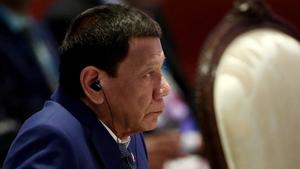Amid coronavirus fears, Philippine president tells citizens to spurn Sinophobia
 Philippine President Rodrigo Duterte. (PHOTO / AGENCIES)
Philippine President Rodrigo Duterte. (PHOTO / AGENCIES)
Philippine President Rodrigo Duterte has urged citizens to reject Sinophobia in light of the novel coronavirus outbreak that has stoked fears in the country.
At an evening press briefing on Feb 3, Duterte called on Filipinos not to blame the Chinese and be hostile to them.
“China has been kind to us. We can only show the same favor to them. Stop this Sinophobia,” he said.
Duterte said making Sinophobic remarks “is not only a case of bad taste but it is not good for us Filipinos to be saying that”.
Duterte made the statements the day after the Department of Health said that a 44-year-old Chinese man from Wuhan, who entered the Philippines last month, had died after contracting the virus.
The victim was also the companion of a 38-year-old Chinese woman who had earlier been confirmed with the virus. They were both admitted to the San Lazaro hospital in Manila.
The man’s death was the first to be attributed to the virus outside China.
The news created fears of a possible epidemic in the country. But Duterte assured Filipinos “that everything is well in the country. There is nothing really to be extra scared of that (novel) coronavirus.”
He instructed Health Secretary Francisco Duque to reserve a space for people who need to be quarantined.
Mario Panaligan, vice-president of the Philippine College of Physicians, said one of the most difficult tasks for public officials and health professionals is to ease the widespread anxiety felt by many Filipinos.
He instead urged Filipinos to follow the advice of the Department of Health, maintain basic hygiene practices and use their face masks properly.
“This is the containment phase. What we know is that many individuals are being monitored because of the exposure and risk of the novel coronavirus,” Panaligan said.
The Department of Health on Feb 4 said 105 people were currently under observation for the virus.
On Jan 31, Duterte ordered a temporary halt on visitors from China’s Hubei province.
Panaligan is also a member of the Inter-agency Task Force for the Management of Emerging Infectious Diseases.
The task force, composed of representatives from various government agencies and the private sector, had recommended the travel ban.
The ban, however, has caused problems for Filipinos working in China. Some of these workers had returned to the Philippines during the Chinese New Year holiday and were left stuck at Manila’s airport.
There are over 200,000 Filipinos working on the Chinese mainland, and in Hong Kong and Macao.
A 30-something Filipino architect in Hong Kong said his helper was not able to fly out of Manila because of the ban. He was still trying to rebook the helper’s flight.
Virus-related reports immediately depressed market sentiment. At the close of trade on Feb 3, the Philippine Stock Exchange ended the day down 63.76 points.
“It is sending a lot of negative vibes to the market,” said Justino Bernardo Calaycay, research head of Manila-based brokerage Philstocks Financial Inc.
Calaycay expects the tourism sector to suffer most from the fears caused by the virus.


